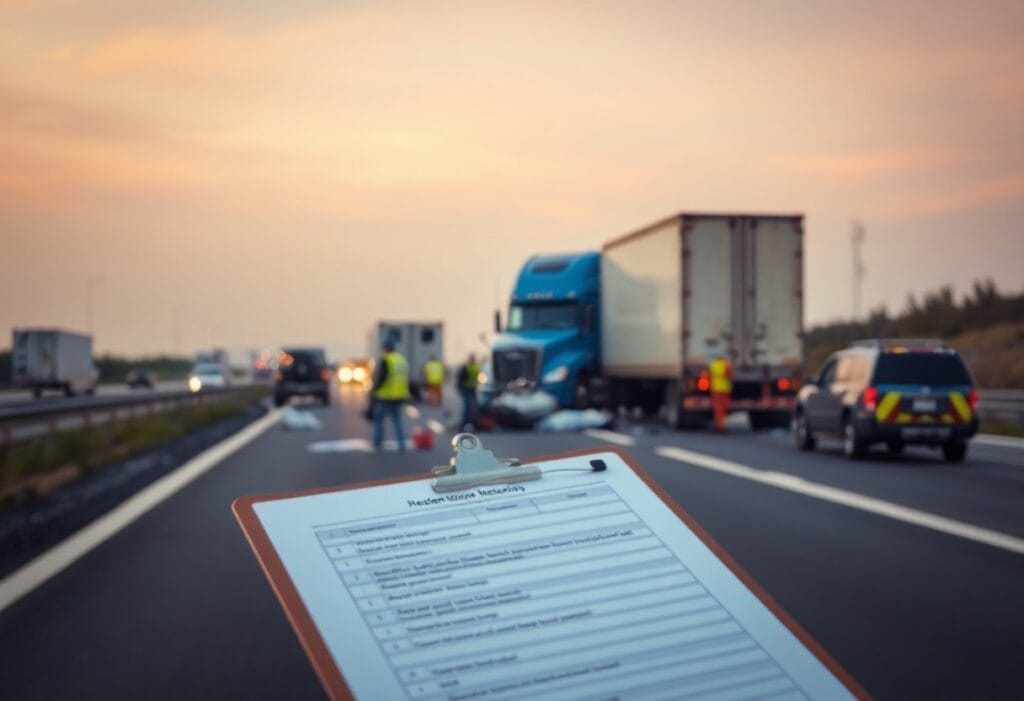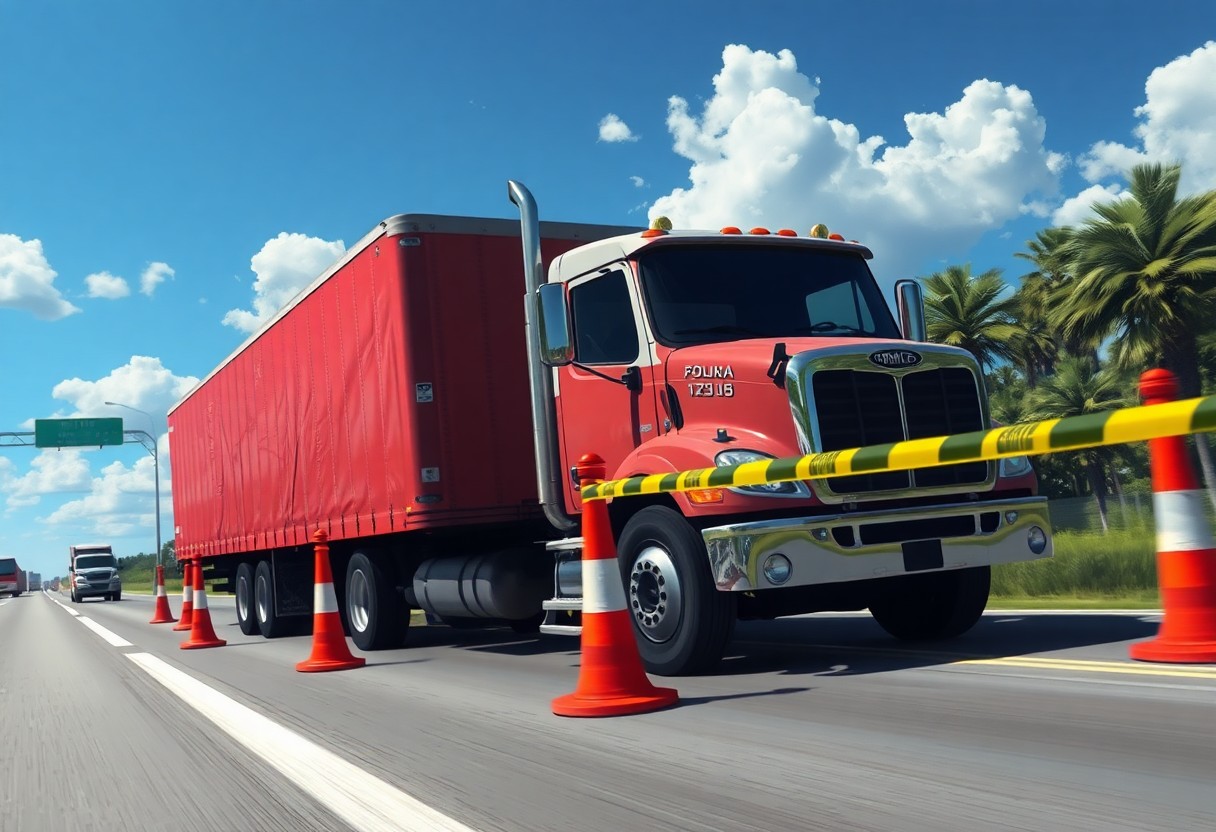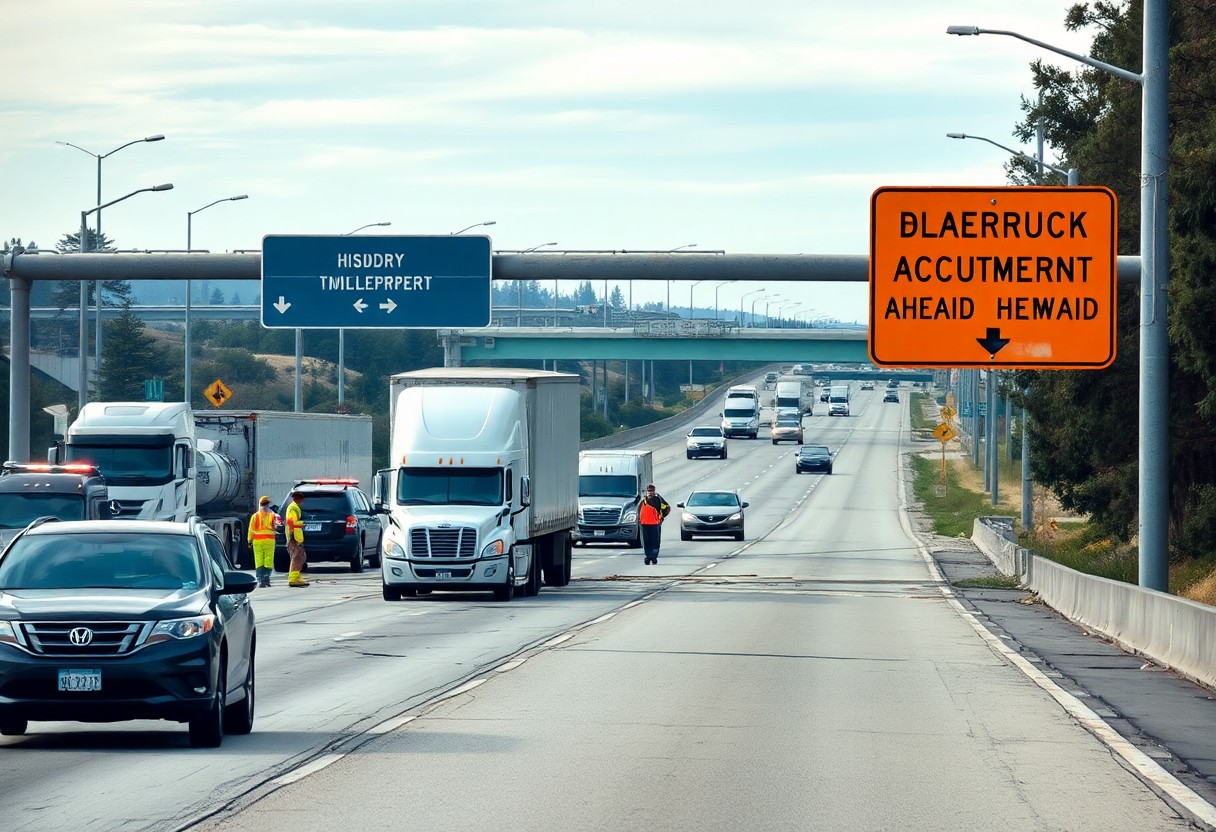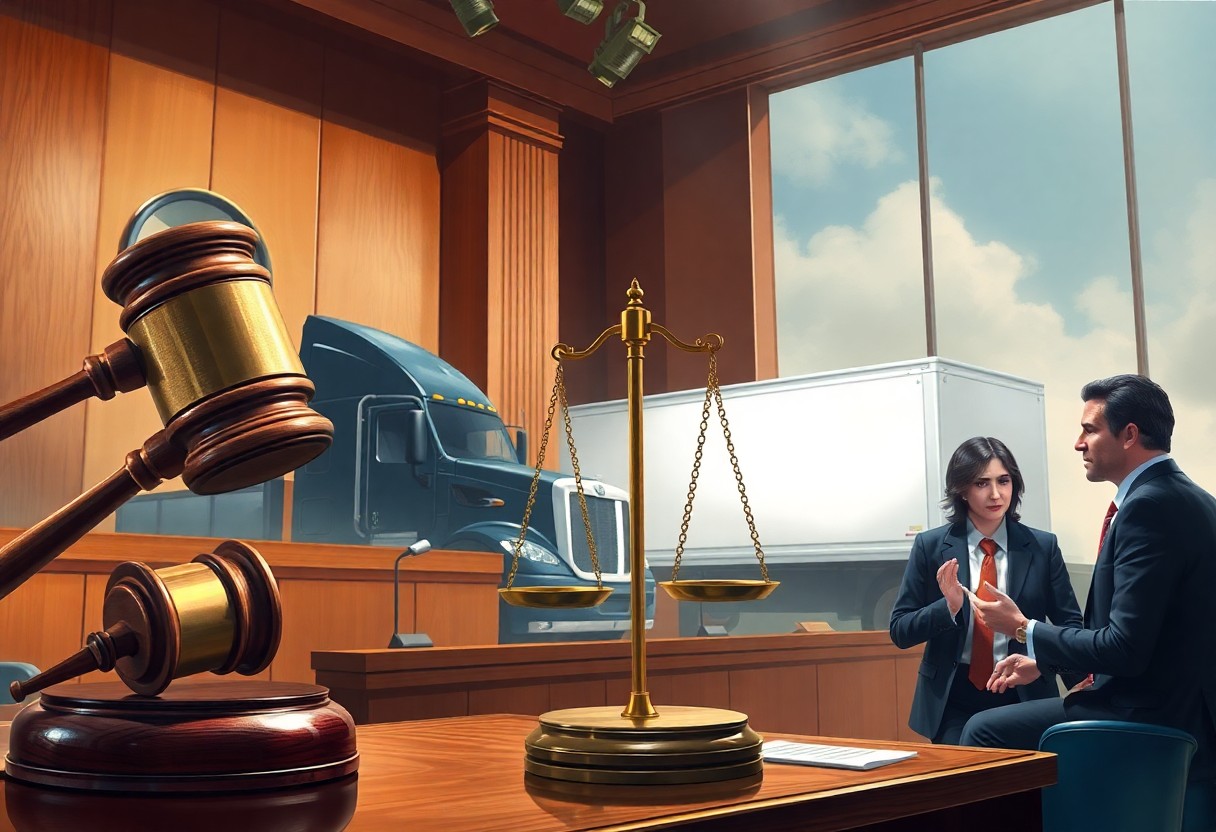Crash scenarios involving large trucks can leave you feeling overwhelmed and vulnerable. In this guide, you will discover the vital steps to take immediately after a truck accident, as well as how to navigate the compensation process effectively. From documenting the scene to understanding your rights, this comprehensive roadmap is designed to empower you with the knowledge you need to secure the compensation you deserve. By following these steps, you can approach your situation with confidence and clarity.
Understanding Mobile Truck Accidents
The landscape of mobile truck accidents is varied and complex. Understanding the types of incidents that can occur on the road can be necessary for victims seeking compensation. Truck accidents can range from minor fender-benders to catastrophic collisions that cause serious injuries or fatalities. The different scenarios often involve various vehicles, road conditions, and driving behaviors. Below is a breakdown of some common types of truck accidents:
| Type of Accident | Description |
|---|---|
| Rear-End Collisions | Occurs when a truck strikes the rear of another vehicle. |
| Jackknife Accidents | Happens when the trailer swings out and forms an angle with the cab. |
| Rollovers | Involves the truck tipping over due to sharp turns or overloading. |
| Side-Impact Collisions | Occurs when the side of a truck strikes another vehicle. |
| Multi-Vehicle Pileups | Involves multiple vehicles in a chain reaction due to a truck’s action. |
Types of Truck Accidents
Understanding the various kinds of truck accidents can help you assess the potential risks and dynamics involved in each situation. The varied types of truck accidents can result in different legal implications and compensation opportunities. Knowing the type of accident can guide you in making informed decisions when pursuing your claim.
Common Causes of Truck Accidents
Accidents involving trucks are often the result of multiple factors. A significant contributing factor can be the behavior of truck drivers, such as driver fatigue, inadequate vehicle maintenance, and speeding. External factors such as poor weather conditions and road hazards also play a critical role. Additionally, other drivers may contribute to a truck accident through reckless driving or not maintaining a safe distance. Each of these elements can lead to a tragic outcome on the road.
Understanding the common causes of truck accidents helps you to identify key elements that may have led to your incident. For instance, driver negligence such as distracted driving or substance abuse can greatly increase the likelihood of an accident. Additionally, the lack of proper training for drivers and inadequate safety regulations can lead to serious injuries and fatalities. Being aware of these hazards not only prepares you better for your case but empowers you to advocate for safer conditions on the road.
Step-by-Step Guide for Victims
One of the most challenging aspects of a truck accident is knowing how to respond afterward. To help you navigate this complicated time, refer to the following table outlining vital steps to take and things to consider.
Immediate Actions After an Accident
| Check for Injuries | Assess yourself and others for any injuries. Call for emergency services if needed. |
| Move to Safety | If it’s safe, move to a location away from oncoming traffic to avoid further incidents. |
| Document the Scene | Take photos of the accident scene, vehicle damage, and any visible injuries. |
| Exchange Information | Gather contact and insurance details from other drivers involved in the accident. |
| Notify Your Insurance | Contact your insurance company to report the accident and understand your coverage options. |
Immediate Actions After an Accident
Little can prepare you for the chaos following a truck accident, but taking immediate actions helps you manage the situation effectively. Start by checking yourself and others for injuries, as your safety and well-being are paramount. If you or anyone else requires medical attention, don’t hesitate to call for emergency services. Once everyone is safe, carefully move away from the vehicles to avoid any secondary accidents.
Next, document everything. Utilize your phone to take comprehensive photos of the scene, including vehicle damages and any visible injuries. Collect information from other drivers involved as well, noting their contact and insurance details. After gathering necessary information, reach out to your insurance company to inform them about the accident. As you share the details, clarify your coverage options to ensure you are aware of the assistance available to you.
Navigating the Claims Process
Process can often feel overwhelming, but knowing the steps to take can ease some of that burden. Start by gathering all documentation related to the accident, including police reports, photographs, witness statements, and medical records. This information will be vital as you initiate your claims process. Contact your insurance provider to formally file your claim and ask them about specific procedures you need to follow.
Claims can be complicated, and understanding the nuances of the claims process is vital. It’s advisable to consult with an attorney specializing in truck accidents to ensure that your rights are protected. They can help you gather required evidence, negotiate with insurance companies, and seek total compensation for damages. Being thoroughly prepared will aid in minimizing stress during this trying time and maximize potential recovery.
Important Factors to Consider
You may find yourself navigating a complex landscape after a mobile truck accident. There are several important factors to consider in order to pursue the compensation you deserve effectively. Here are some key elements to keep in mind:
- Extent of Your Injuries: Documenting your injuries can impact your claim significantly.
- Insurance Policy Details: Understanding the coverage limits will guide your next steps.
- Accident Evidence: Gathering evidence such as photographs or witness statements can strengthen your case.
- Time Limitations: Be aware of the statute of limitations in your state to avoid missing crucial deadlines.
Thou must stay organized and diligent in addressing these factors to optimize your chances of a favorable outcome.
Insurance Information
Even a seemingly straightforward truck accident can result in complicated insurance issues. You’ll need to gather as much relevant insurance information as possible to determine who is liable and what your coverage options are. Contact your insurance provider to report the accident as soon as you are able, and ensure you understand your policy limits as well as any deductibles that might apply to your situation.
In addition, it is crucial to obtain the insurance information from the truck driver and the trucking company involved in the accident. Verify their insurance coverage and any policy specifics that could impact your claim. This information can be pivotal in determining who will ultimately cover your medical expenses, lost wages, and property damage.
Legal Rights and Responsibilities
With every accident, you have distinct legal rights that can influence the compensation process. You are entitled to pursue damages for your injuries and other losses, but it comes with certain obligations, such as providing accurate information to your insurer and cooperating with any investigations. Understanding both your rights and responsibilities will empower you as you navigate your claim.
Insurance companies often look for any means to minimize their payouts, making it vital to be proactive about your legal rights. Take the time to familiarize yourself with the laws in your state regarding truck accidents. If there are disputes about liability or compensation, consulting a legal professional can clarify your standing and assist you in protecting your interests.
Tips for Successful Compensation Claims
Many victims of mobile truck accidents find the process of filing a compensation claim overwhelming. However, you can increase your chances of a successful outcome by following these vital tips:
- Document all details of the accident immediately.
- Collect contact information from witnesses.
- Obtain a copy of the police report.
- Keep records of all medical treatments and expenses.
- Consult a legal expert specialized in truck accident cases.
Utilizing these strategies effectively can help clarify the circumstances surrounding your accident. Recognizing the importance of thorough preparation in your claim can lead to a more favorable resolution.
Documenting the Accident
Compensation claims rely heavily on the details you compile after the accident. Make sure to record the date, time, and location of the incident, along with the conditions that contributed to it. You should also take photographs of the scene, vehicle damage, and any visible injuries. These records can be pivotal in establishing liability and demonstrating the impact of the accident on your life.
Gathering Evidence
Even after documenting the accident, it is important to gather additional evidence to support your compensation claim. This may include gathering medical records that illustrate the extent of your injuries, any lost wages due to time off work, and medical bills reflecting ongoing treatment. Additionally, locating any available surveillance footage from nearby cameras can substantiate your account of the events leading up to and following the accident.
With comprehensive evidence in hand, you bolster your position when negotiating with insurance companies. The more detailed and organized your documentation, the greater your chances of securing a favorable settlement. Stay committed to assembling all relevant materials that may strengthen your case, as this diligence will pay off in your pursuit of fair compensation.
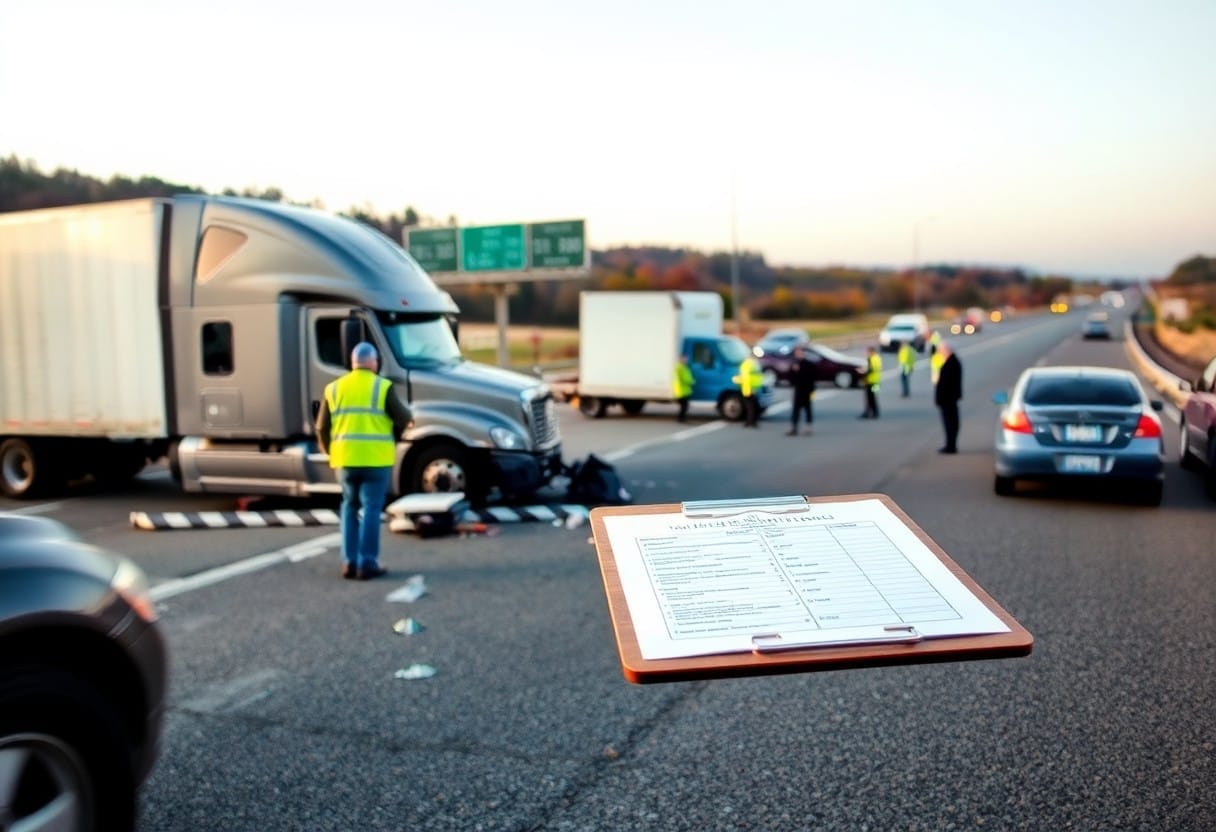
Pros and Cons of Pursuing Compensation
All truck accident victims face the difficult decision of whether or not to pursue compensation after an accident. Understanding the advantages and disadvantages can help you make a more informed choice. Below is a summary of the pros and cons of pursuing compensation for your truck accident claim:
| Pros | Cons |
|---|---|
| You can recover medical expenses related to your injury. | The claims process can be complex and time-consuming. |
| Compensation can cover lost wages during your recovery. | You may need to deal with insurance companies that are uncooperative. |
| The claim may provide financial security for your future. | You might face resistance or lawsuits from the other party. |
| Your claim can hold negligent parties accountable. | The outcome may not meet your expectations. |
| Legal representation can guide you through the process. | Filing a claim could prolong emotional stress. |
If you want more information about the steps to take after an accident, check out What To Do After a Truck Accident (12 Steps).
Benefits of Filing a Claim
An often overlooked aspect of pursuing compensation is the tangible benefits it can provide. By filing a claim, you have the opportunity to recover costs related to your medical bills, rehabilitation fees, and even property damage. This financial support can be a lifeline during your recovery period, allowing you to focus on healing rather than financial stress. Additionally, compensation can cover lost wages if your injuries have kept you from working, giving you the peace of mind to concentrate on your physical well-being.
Another significant benefit is that filing a claim can increase awareness and accountability regarding truck driver safety and regulations. When you pursue a claim, you are indirectly contributing to a safer driving environment for others on the road by holding negligent parties responsible for their actions. This can lead to necessary changes in practices and policies, ultimately enhancing safety standards in the trucking industry.
Potential Drawbacks and Challenges
Now that you have an understanding of the benefits, it’s important to consider the potential drawbacks and challenges associated with pursuing compensation. The claims process can be a major source of stress, requiring extensive documentation, communication with insurance companies, and sometimes lengthy legal proceedings. You may also encounter pushback from the other party or their insurance company, making the path to compensation more difficult than anticipated.
Potential drawbacks include the emotional toll that pursuing compensation can take on you. Handling legal matters amidst recovery from injuries can be overwhelming. It may involve navigating complex laws and procedures, which can contribute to feelings of frustration and anxiety. Additionally, the outcome of your claim is uncertain; even with valid claims, compensation amounts may not always meet your expectations, which can lead to feelings of disappointment.
Resources for Truck Accident Victims
For those who have been involved in a truck accident, it is crucial to seek out the appropriate resources that can assist you during this difficult time. Whether you are looking for legal aid, counseling services, or community support, there are various options available to help you navigate the complexities following an accident. By accessing the right resources, you can empower yourself to make informed decisions about your recovery and compensation.
Legal Support Options
Clearly, finding the right legal support is fundamental to ensuring that you receive the compensation you deserve. Consult with an attorney who specializes in truck accidents and has a proven track record of handling similar cases. They can help you understand the intricacies of insurance claims, negotiate settlements, and represent you in court if necessary. Additionally, many law firms offer free consultations, allowing you to discuss your case without any financial commitment.
Support Groups and Counseling
If you are struggling emotionally or psychologically after the accident, consider joining a support group or seeking professional counseling. These resources can provide a safe space for you to share your experiences and connect with others who understand what you’re going through. Professional counselors can help you work through feelings of anxiety, depression, or trauma that may arise after such an incident, promoting your overall mental well-being.
Legal resources, such as support groups and counseling, can be invaluable in your recovery process. They not only offer a sense of community but also help you develop coping strategies to manage the unique challenges that come with being involved in a truck accident. Take the time to seek out these options, as they can provide the emotional and psychological support you may need to heal effectively.
Summing Up
With these considerations, navigating the aftermath of a mobile truck accident can feel overwhelming, but understanding the steps you need to take can ease your journey toward compensation. Familiarizing yourself with the necessary documentation, identifying responsible parties, and collecting evidence are integral to building a solid case. By taking prompt action and seeking professional guidance, you can ensure your rights are upheld and that you receive the financial support needed to cover your medical expenses, lost wages, and other damages related to the accident.
Your path to compensation may involve negotiations with insurance companies or potentially filing a legal claim, but staying informed and proactive will empower you during this challenging time. By effectively following the step-by-step process outlined in this guide, you can navigate the complexities of your situation with confidence and focus on rebuilding your life after the accident. Each decision you make now can lead to positive outcomes as you seek the justice and compensation you deserve.


